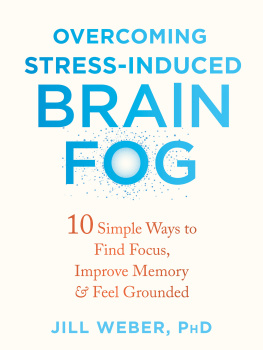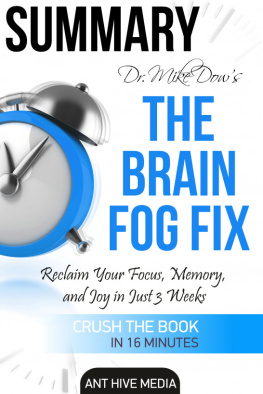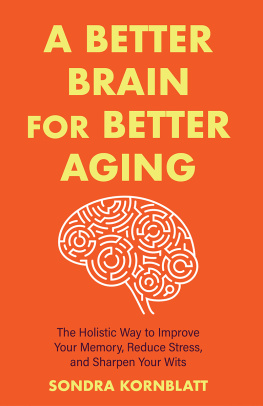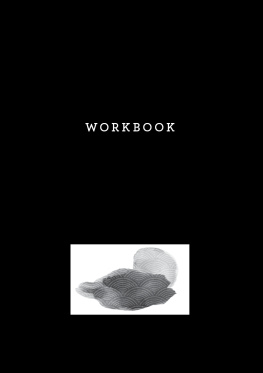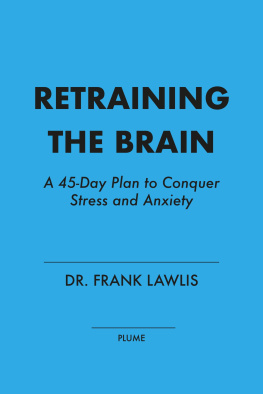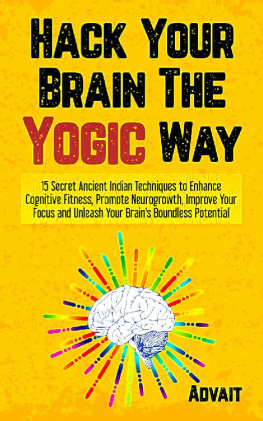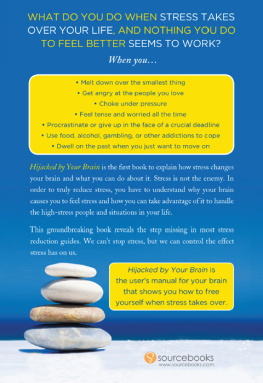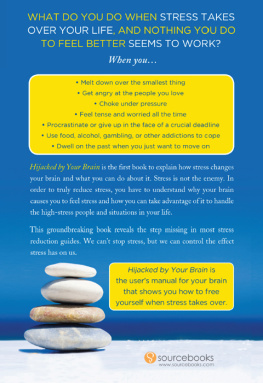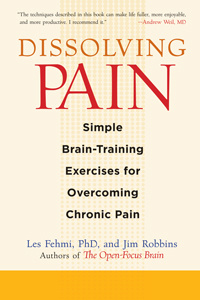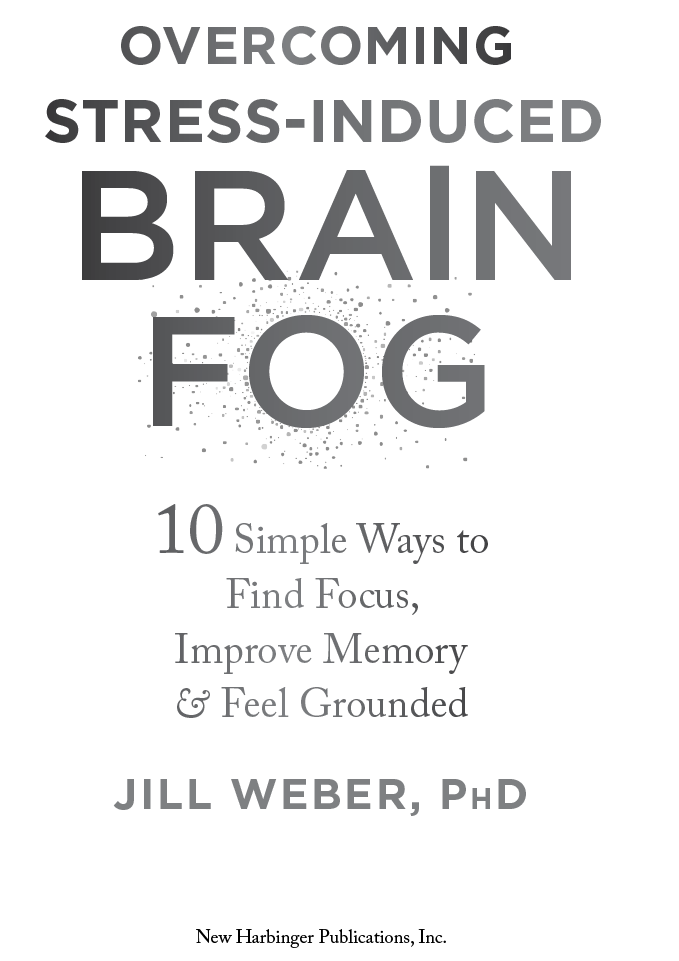Jill Webers incisive description of stress-induced brain fog will resonate with many readers, all the more so in the wake of the chronic stress evoked by the COVID-19 pandemic. To help us cope with and bounce back from this debilitating and demoralizing condition, she provides practical, comprehensive, evidence-based suggestions for tending to our mental and physical well-being and getting more joy from our days.
David A. F. Haaga, PhD , professor of psychology, and director of clinical training at American University
Jill Weber has written a very important book at a critical timea time when many are crippled by stress-induced brain fog and fatigue. In this thoughtful, insightful, and research-driven book, Weber goes beyond explaining the brain fog epidemic and offers specific strategies for immediate relief. This book is an invaluable, modern resource for clinicians and laypeople alike.
Tanie Miller Kabala, PhD , licensed psychologist, author of The Weight Loss Surgery Coping Companion , and creator of Rest and Restore
In this wonderful book, Jill Weber demystifies the phenomenon of stress-induced brain fog. Her relatable examples and thought-provoking exercises help to illustrate how stress might be impacting ones ability to think clearly. Weber is an insightful guidehelping to restore a sense of focus and well-being. Before slogging through another day, I highly recommend reading this book to feel more control of your mind and your life.
Emily Aron, MD , child, adolescent, and adult psychiatrist; and associate professor at Georgetown University School of Medicine
With more and more people suffering from the cognitive effects of stress, Jill Weber offers a beacon of hope, with actionable strategies to reclaim mental clarity.
Andrea Bonior, PhD , licensed clinical psychologist, and author of Detox Your Thoughts
Publishers Note
This publication is designed to provide accurate and authoritative information in regard to the subject matter covered. It is sold with the understanding that the publisher is not engaged in rendering psychological, financial, legal, or other professional services. If expert assistance or counseling is needed, the services of a competent professional should be sought.
NEW HARBINGER PUBLICATIONS is a registered trademark of New Harbinger Publications, Inc.
New Harbinger Publications is an employee-owned company.
Copyright 2022 by Jill Weber
New Harbinger Publications, Inc.
5674 Shattuck Avenue
Oakland, CA 94609
www.newharbinger.com
All Rights Reserved
Cover design by Amy Daniel Acquired by Jess OBrien Edited by Brady Kahn
Library of Congress Cataloging-in-Publication Data
Names: Weber, Jill P., 1973- author.
Title: Overcoming stress-induced brain fog / Jill Weber.
Description: Oakland, CA : New Harbinger Publications, Inc., [2022] | Includes bibliographical references.
Identifiers: LCCN 2022018696 | ISBN 9781684039944 (trade paperback)
Subjects: LCSH: Stress (Psychology) | Cognition. | Anxiety. | Mindfulness (Psychology) | BISAC: SELF-HELP / Self-Management / Stress Management | PSYCHOLOGY / Cognitive Psychology & Cognition
Classification: LCC BF575.S75 W436 2022 | DDC 155.9/042--dc23/eng/20220425
LC record available at https://lccn.loc.gov/2022018696
Contents
With love and gratitude for the stars that light my way, Matt, Maddie, and Willie.
Introduction
Have you ever felt that you cant quite relax? Even when you have downtime, between your tasks, job, schoolwork, children, and other responsibilities, youre not at peace. Instead, your brain defaults to a keyed-up, disjointed sense of yourselfa kind of mental frazzle. Or, do you feel sluggish or struggle to focus, concentrate, and remember what you should be doing, and even as you make this effort, your mind drifts: Why did I waste the day again? I should be organizing my garage, cleaning out my closets. Why am I so unmotivated? or I forget what I was supposed to be doing, or I can never get anything done. What is wrong with me? or I cant believe how much I used to be able to do and now I am barely holding on. And before you know it, youve lost another hour to these coiling thoughts. You feel empty and criticize yourself for wasting the opportunity to start that work project, teach your children something new, or do something just for the joy of it.
You are not alone; many people are feeling this at some level. We are living in a changing, uncertain world. We shoulder the burden of too much responsibility and overcommitment in all sorts of domains: work, school, relationships, and family. We are daunted by the worlds ongoing stressors: bitter national politics; droughts, fires, and bigger and more frequent storms spinning out of climate change; evolving norms in financial markets; the demands of new technology; the thought of jobs being lost to artificial intelligence; fears of unemployment; global crises like the COVID-19 pandemic; and more.
The absolute immediacy of cell phones may leave us feeling as though we need to be accessible and responsive twenty-four hours a day. To be productive and keep up with the social pace, we check and check again our texts, emails, dating apps, phone calls, breaking news, and social media updates.
These forces affect some of us more than others. But, taken together, they inject a load of stress into our society. Some of my clients explain that they are left with an ongoing sense of dread, walking on eggshells, or waiting for the other shoe to drop. When you layer onto this already anxious reality an additional life stressor, such as a medical illness for yourself or a family member, a divorce, a breakup, a cheating spouse, a death in the family, job loss, or a new baby, you literally stop being able to think straight. This is a state of stress-induced brain fog.
Stressed-induced brain fog is when youre no longer able to focus and remember at your usual capacity. You feel sluggish, scattered, and disorganized. You check boxes and go through the motions of life, but you also feel a lack of meaning and connection with yourself, your loved ones, and your job or other responsibilities.
When stress is chronic, as is often the case with brain fog, our brains physiological reaction, the fight-or-flight response, remains activated. As a result, stress hormones, most notably cortisol and adrenaline, persistently pulse through the body. Feeling depressed, losing focus, feeling on edge, not being able to remember things, and having trouble concentrating or sleeping can all be linked to chronically high cortisol levels. So, when you feel as if what youre experiencing is more than a bad week or month, youre right.
Many believe that to be successful, they have to be stressed out, overbooked, and constantly plugged in. In fact, some tell themselves that living on five hours of sleep, drinking coffee all day, and never missing an email is precisely why they keep up and remain effective. But these patterns arent sustainable. Make no mistake, everyone has a breaking point. Perhaps youve already hit yours, and you know it. Or maybe you feel brain fog setting in and you want to know what to do about it before it gets any worse. Whatever your particular situation, living with brain fog is not necessary for successand adopting the skills in this book will stop your situation from getting any worse.
Stressed-induced brain fog is different from the mental fog that is caused by medical and neurological conditions, such as Alzheimers or dementia, or the neurological symptoms that may result from surgery, pregnancy, or COVID. This is because stressed-induced brain fog is not the result of a medical condition but a result of stress in your environment and your reaction to it. Over time, an accumulation of life stress leaves you feeling depleted and unfocused, and at some point, the pot boils over and you can no longer healthfully manage.

